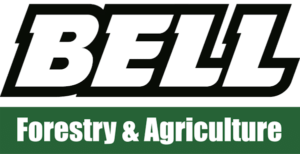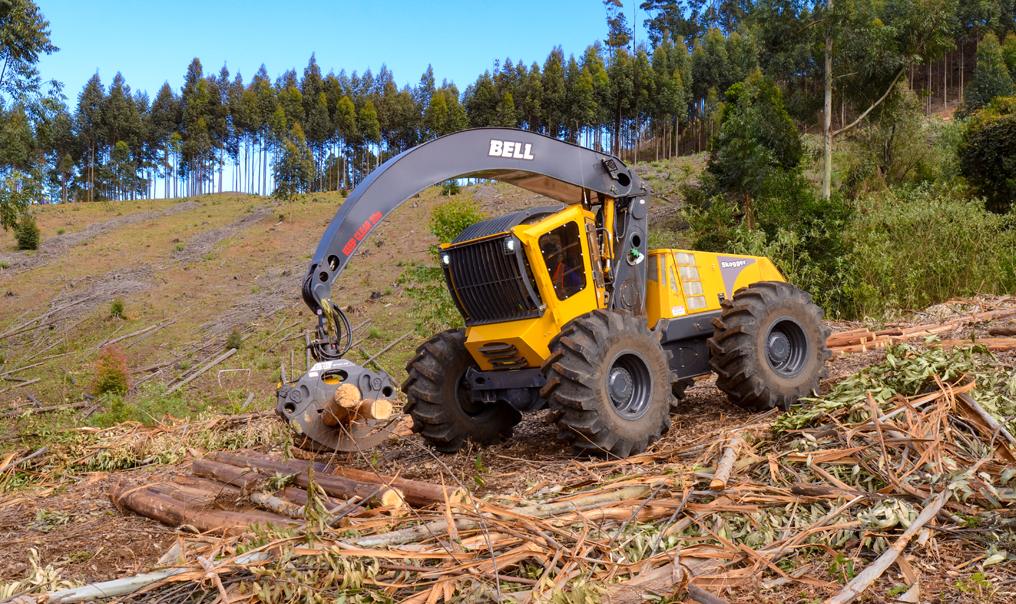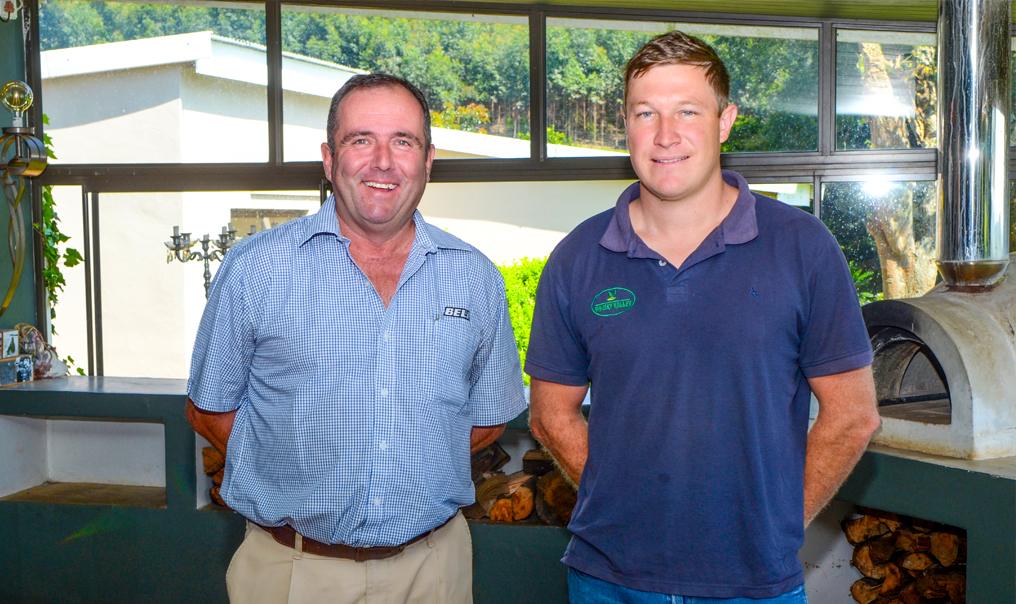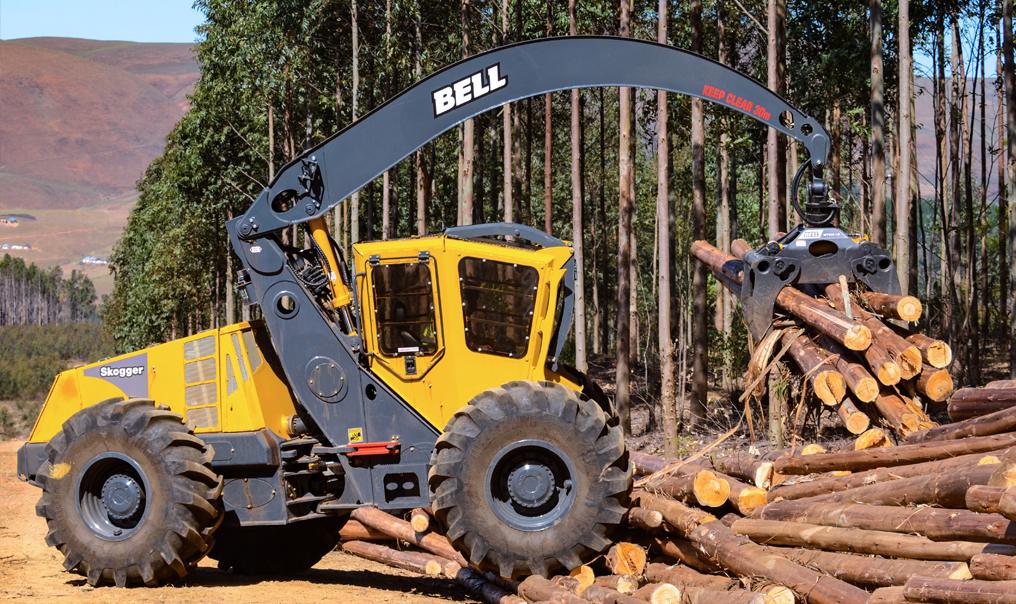“We had started felling our own Eucalyptus on our farm using one and later two chainsaws and we thought we could master another skillset to add to our income,” Wes tells us. “Working with real production targets though, we saw almost immediately that we’d need to mechanise, and do that quickly to offer our clients a sustained service.”
Wes and his wife, Kira, live on a farm in the Harding district of Southern KwaZulu-Natal and, having both grown up there, the couple has become passionate about growing timber. Kira’s father, Jon McKenzie, is a well-known farmer and former NCT ‘Farmer of the Year’ recipient in the area and Wes keenly acknowledges and values the continuous mentoring he receives from his father-in-law.
“Our timber-growing clients had started growing gum around eight years ago. Their thinnings regime would see the first thinnings at six years, again at 12 to 13 years, with harvesting at 18 to 20 years. We had a lot to consider when harvesting for them, such as getting the wet and slippery felled timber out of the compartment before it dried out too much, especially when it was peeled timber – meaning the bark has been taken off. This timber is meant for export to the Far East.”
Wes explains that the impact of machines on the soil was also an important environmental factor as the timber growing companies adhere to strict environmental guidelines under the Forestry Stewardship Council (FSC). Given the steep terrain around the Weza area, where the harvesting was taking place, Wes realised they needed a special machine with enough power to extract timber quickly and efficiently while having a low ground impact and the ability to stack and load as well.
“I initially thought to attach a rotating timber grab to a telehandler and replace the standard tyres with high-flotation tyres to lower the ground impact. This idea stuck in my head until I found something unique on the internet – the Bell Skogger. By this time our harvesting contract had solidified, and we were under pressure to perform.”
Wes knew Keith Milne, Bell Equipment’s Sales Representative working out of Pietermaritzburg, and a call to Keith confirmed that the Bell Skogger was indeed all it promised to be.
“As this was a new concept, and something certainly never seen in our area, there was a bit of skepticism all round, which is quite natural, but I was convinced this was the right tool for our application,” Wes says. “My own father, Dieter, who has a wealth of knowledge regarding mechanics and can often see elements in the design and build of a machine, accompanied me on a trip to the Bell factory at Richards Bay. After he had inspected the Skogger up close, he gave it a big thumbs-up in terms of its solid design, build and all-round safety features. With his ‘out of the box’ thinking, he approaches mechanical challenges differently to what a farmer may do and to have the privilege of some of that knowledge injected into my agricultural systems can only spell positive things.”
Wes and Jon discussed the pros and cons of the Bell Skogger in their application at length and placed the order for the machine in July 2023, which was subsequently delivered the following month. A challenge then was to find an operator young enough to grasp the new technology. In the end, Wes settled on Mbusane Nkomo, who had operated a timber forwarder before and was used to joystick controls.
“Whenever Mbusane is on lunch, I’m happy to hop into the Skogger and operate it. I absolutely love the feel of its power and agile manoeuvrability, especially under a load,” Wes adds, smiling broadly.
We asked Wes whether the Skogger has made a difference to their harvesting and extraction operations and performance. “As soon as the operator, Mbusane, felt more at home in the Skogger and started operating it instinctively, the change in our performance was most noticeable. We now have seven chainsaw gangs that fell, debark and de-branch the timber and present it for full mechanised extraction,” says Wes.
“It has further taken away two tractor-trailer units and eight manual labourers who can be deployed in meaningful roles elsewhere. But most importantly, it has secured consistent volume, which is the main thing in contract harvesting. That is how one’s production is best measured.”
Wes and his clients are especially pleased with the Skogger’s low ground impact and all-wheel drive traction. Its performance is not hampered by wet weather and where larger machines are invariably stopped in rain, the Skogger soldiers on as there is hardly any soil disturbance.
“We mentioned the Skogger’s manoeuvrability earlier on and this is particularly evident due to its articulation that allows the machine to move through 3×3 planting spaces and not damage any trees on its way through. And then to cap it all, it does all this while only using between seven and eight litres of diesel an hour, which has a real and positive impact on our bottom line.
“I should add that timber harvesting is but one aspect of our farming operation. While it offers a fun learning curve and helps to spread the risk, it is teaching us new skills all the time, and as we learn more about what the Skogger can do,” Wes says, smiling. “It’s also made a lot of people in this area incredibly curious. We’re forever passing acquaintances and strangers on our way to the harvesting area who have come to look at how our Skogger performs in this challenging environment, which is good for growing timber but tough on man and machine.”





